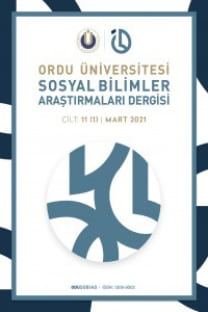Düşük Sosyo-Ekonomik Duruma Sahip Ailelerin İçinde Bulundukları Duruma İlişkin Değerlendirmeleri
Aile, Ekonomi, Sosyal sorun, Yoksulluk, İşsizlik
Evaluations of Families with Low Socio-Economic Status Regarding Their Situation
Family, Economy, Social problem, Poverty, Unemployment,
___
- Patton, M. Q. (2014). Qualitative Research & Evaluation Methods. California: Sage Publications.
- Polat, G. (2014). Madde bağımlılığı tedavisinde sosyal hizmet mesleği. Okmeydanı Tıp Dergisi, 30(2), 143-148.
- Sirgy, M. J. (1986). A Quality‐of‐Life Theory Derived from Maslow's Developmental Perspective: ‘Quality’Is Related to Progressive Satisfaction of a Hierarchy of Needs, Lower Order and Higher. American journal of Economics and Sociology, 45(3), 329-342.
- Şener, Ü. (2012). Kadın yoksulluğu. Mülkiye Dergisi, 36(4), 51-67.
- Thomson, E. (2014). Family complexity in Europe. The Annals of the American Academy of Political and Social Science, 654(1), 245-258.
- Toper, F. (2019). Özkan Y. Huzurevinde kalan yaşlilarin algiladiklari sosyal destek düzeylerinin bazi değişkenlerle incelenmesi. Uluslararası Sosyal Araştırmalar Dergisi, 12(68), 739-747.
- Ulutaş, M. (2021). Göreli Yoksunluk (Mahrumiyet) Kuramı (Relative Deprivation Theory). M., Mete (Ed.), İktisadi ve İdari Bilimlerde Teori ve Araştırmalar (s. 415-424). Ankara: Gece Kitaplığı.
- Yusufoğlu, Ö. Ş., & Kızmaz, Z. (2016). Parçalanmış ailelerde yoksulluk ve sosyal dışlanma: Elazığ örneği. Social Sciences. 11(1). 27-40.
- Zengin, E., Şahin, A., & Özcan, S. (2012). Türkiye’de sosyal yardım uygulamaları. Yönetim ve Ekonomi Dergisi, 19(2), 133-142.
- ISSN: 1309-9302
- Yayın Aralığı: 4
- Başlangıç: 2010
- Yayıncı: -
Sınıf Öğretmenlerinin Çeşitli Öğretim Yöntem ve Tekniklerini Kullanma Durumları
Duygu Odaklı Terapinin Türk Kültüründe Uygulanabilirliğinin Değerlendirilmesi
Mehmet Rüştü KALAFATOĞLU, Seher BALCI ÇELİK
Kadın Aşçıların Cam Tavan Sendromuna Yönelik Metaforik Algıları Üzerine Bir Değerlendirme
Japon Sürrealizmi Bağlamında Tetsuya İshida’nın Resimlerinde Distopik Sürrealizm
Maarif Yıllıklarına Göre Balıkesir’de Eğitim (1950-1960)
Yönetici ve Öğretmen Algılarına Göre Geleceğin Öğrenci ve Velileri: Bir Metafor Analizi Çalışması
Merve YALÇINKAYA, Neslin İHTİYAROĞLU
Câhiliye’den İslâm’a Hakemlik Geleneği
Mütevazı Liderlik ile Beyana Dayalı Kişisel İnisiyatif İlişkisinde Psikolojik Güvenliğin Aracı Rolü
